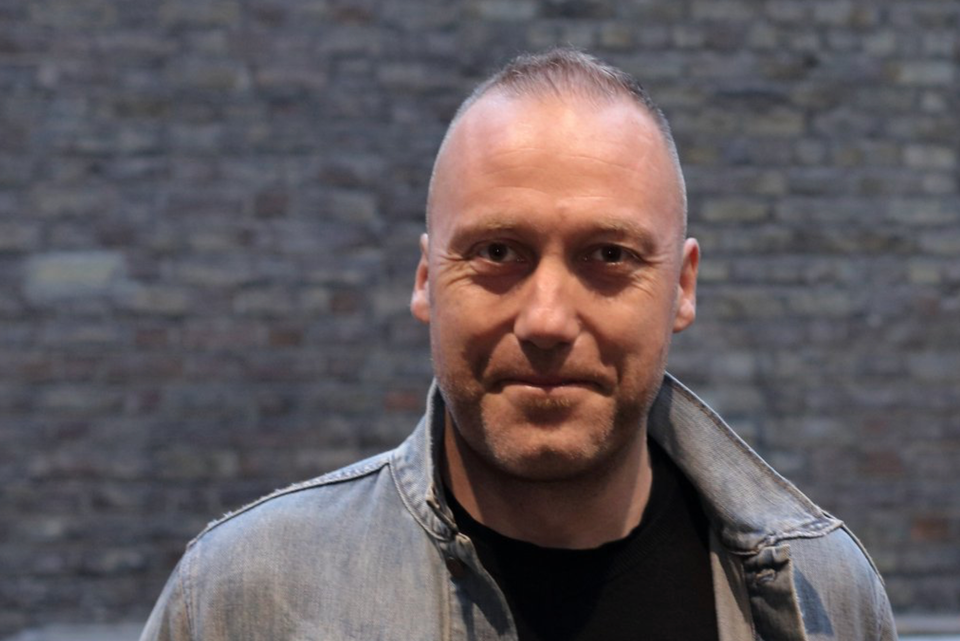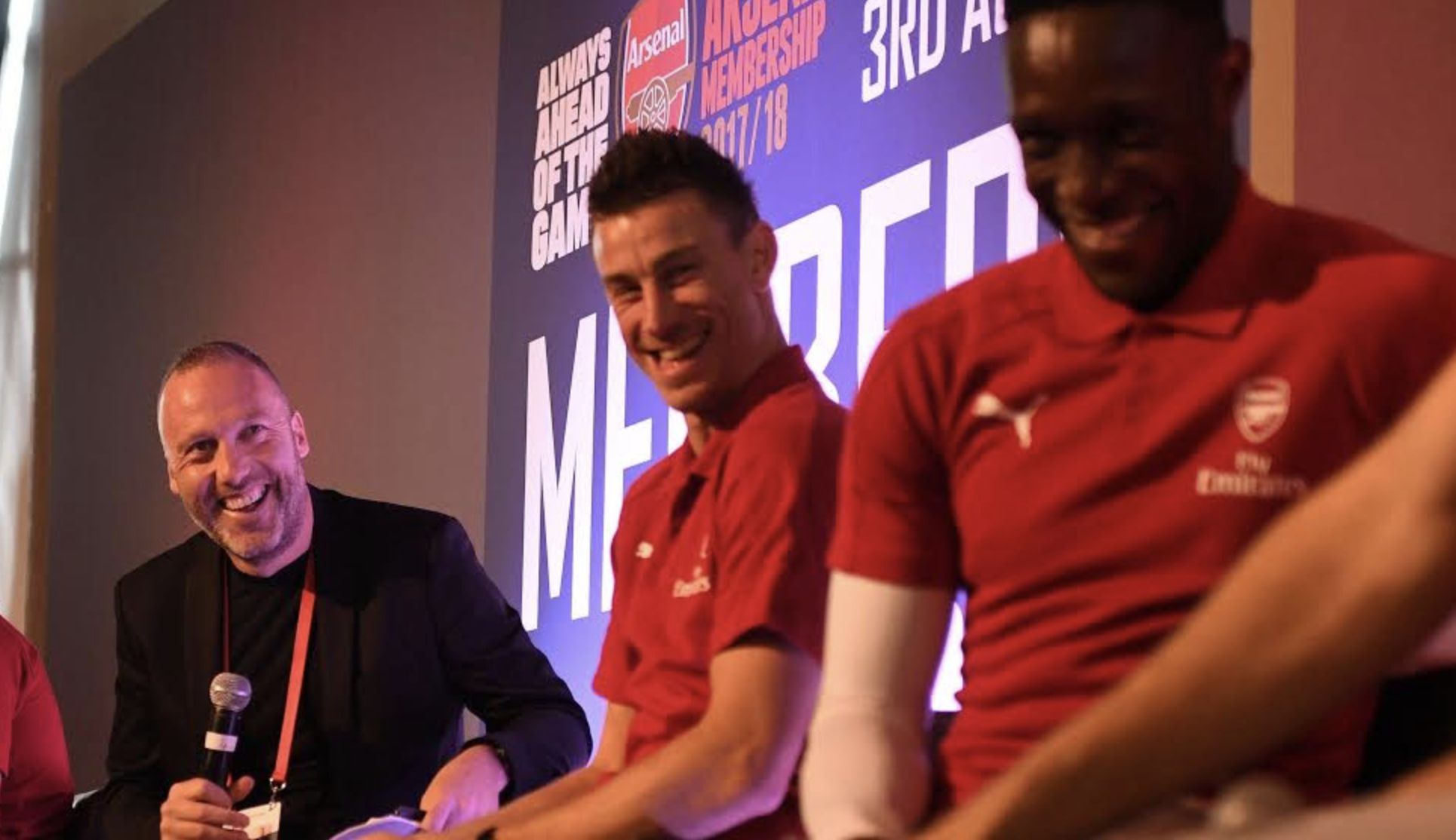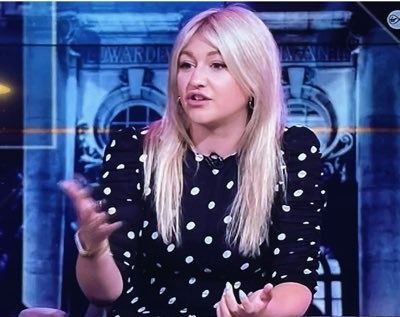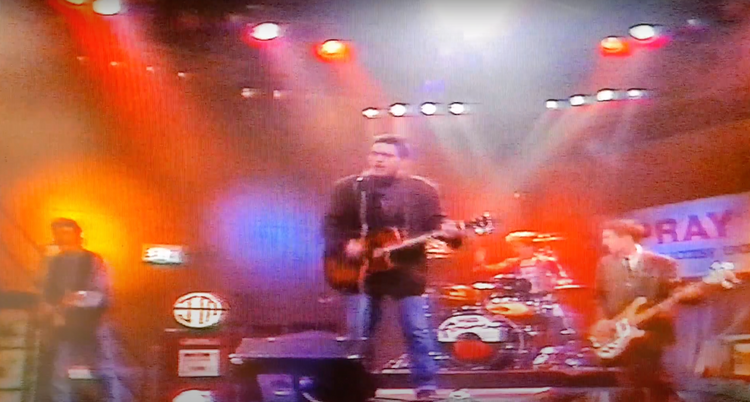DEAN MAGAZINE Meets Andrew ‘Arseblog’ Mangan: His Untold Life as a Dublin DJ

True celebration is rocking out to Neue Deutsche Welle music. Andrew “Arseblog” Mangan knows this to be true. In the wake of his beloved Arsenal Football Club winning the FA Cup in 2020, he greeted Gunnerblog (né James McNicholas), his co-host on the all-things-Arsenal podcast Arsecast Extra, with the sounds of Falcon’s 1985 classic “Rock Me Amadeus,” but with the lyrics changed to include the pair’s traditional greeting “Goodly morning.”
You can hear it now, can’t you? Mangan singing that mammoth, ridiculous chorus with deadpan robotism: Goodly morning, goodly morning do-do-do-do, goodly morning, goodly morning, do-do-do-do.
“Look, I'm a sucker for an eighties classic anyway,” he tells me. “So anything I can work in, in that regard, is always fun.”
The “Rock Me Amadeus” bit is at about 45 seconds in
Long-time listeners of Mangan’s Arsecast, Arsecast Extra, or any other pods in the audio wing of his website Arseblog, will know that music brings extra personality to the shows. He regularly tweaks the funky theme tune of Arsecast Extra, sometimes mixing in a particularly exuberant piece of foreign commentary from a recent Arsenal game, or switching to an upbeat musical breakdown to reflect fans’ celebratory mood. After devastating defeats, he has simply added the sound of a grating, high-pitched scream as the music plays, or let the tune fade away for music from the old Incredible Hulk TV show from the 1970s. Because, Mangan says, “There is no sadder piece of music in the world than the Incredible Hulk thing where he’s walking away from the latest town and nobody wants to be his friend because he’s a monster.”
Such flourishes bring a little bit of variety to each episode. “It’s always fun to try to figure out how you create something in like 30 seconds—it’s a 30 second piece usually,” explains Mangan. “How do you fit it in? How does it scan? How does it match up with the rhythm of the piece? It’s a good bit of fun. It’s another thing that keeps me interested. Because when you do something for as long as I've been doing it, trying to find new things helps keeps it creative.”
Mangan founded Arseblog in February 2002, making him one of the last of the original bloggers still standing. To this day the site is clean, easy to read, and maintains a level of humor in its tone—a throwback to a better time for the internet. The first Arsecast followed in 2006. It’s inevitable that broadcasting became part of Mangan’s burgeoning coverage of his club, and not just because of his excellent voice, which boasts both Khagan authority and brandy and cigar opulence. (He does the occasional bit of voiceover work too. A strange moment for me was walking into a Spar once while listening to the Arsecast, taking off my headphones, and hearing his voice on a radio ad over the shop’s speakers). Alongside football, speaking into a microphone has been one of the consistent passions of Mangan’s life.

He started DJing at just 16 years old on pirate radio in Dublin back in the 1980s. By 1994, Mangan was part of the hugely popular pirate station Kiss 103FM. The studios were a guerilla set up above an Xtravision video rental shop on Whitehall Road, Terenure in the south west of Dublin—in lieu of proper covering, one mic was fitted with an old sock. The station proved incredibly popular, meaning it was very unpopular with both competitors and regulators. Over the course of its eight-month existence, Kiss 103FM’s signal was jammed repeatedly by a (fully licensed) rival station. Mangan and his clandestine comrades even took to taking it in turns to guard their transmitter, which was located in a barn at the back of a farmer’s house in the Dublin Mountains. In fact, it was Mangan and a pal who were on duty when Gardaí with members of the government’s Department of Communications pulled up, forcing them to hide the equipment under some thick shrubbery before fielding uncomfortable questions from the cops.
After Kiss 103FM sadly fossilized, Mangan enjoyed stints at authorized outlets Tipp FM and East Coast Radio. He knew he loved being on air, but he didn’t love being instructed what records to play. It’s why podcasting, a format where he can indulge any and all of his individual proclivities, so easily overtook radio in his interests.
“To just set up a microphone and talk into it, it’s a very liberating thing in a way,” Mangan says. “Because you’re completely free to say and do whatever you want on a podcast. It’s your own radio show—there’s no station manager, there’s no program controller telling you what to say, what to play, when to play it, all that kind of stuff. I always feel very comfortable with it and I think I had a level of expertise from back in the day when it came to audio that allowed me to get it off the ground pretty quickly, pretty successfully.”
Through the 1990s, Mangan also worked as a live DJ. House and other forms of electronica were his modus operandi—“the Detroit stuff, anything that had good piano breaks in it, I’m an absolute sucker for a chord change in the middle of a tune.” But he also took bookings for weddings and birthday parties, “which were always terrible,” he says, “because the young people are going, ‘Will you play a bit more of this’ and the old people are going, ‘Have you not got a bit of this’.” For a time he was spinning records five or six nights a week at clubs on Leeson Street. “And that was playing, Jesus, terrible music. You know, how do you get people up on the dance floor? You play something by M People. And I don’t mean to say M People are terrible, but it was that kind of music you would hear a lot the time when you were in the nightclubs.”
Mangan and some friends put on the occasional club night themselves too. He admits he would have loved to have spun records at The Pod, a famous Harcourt Street venue that opened in 1993. There was just one problem stopping an unbroken rise to the top: he really loved clubbing himself.
“If you’re the guy playing the records, you’re not having the fun, are you? So I was more interested in having the fun than doing the work. But I would say that the sort of music that I was into would have been more like The Pod or System [a club on South Anne Street]. It got a bit more hardcore when you went down the quays, you went to Temple of Sound, that was a bit more techno-y. I was much more into the kind of happy house side of things. But those were fun times. Dublin was quite a cool city from a clubbing perspective.”
What was that last bit, sorry? Dublin, a cool city for clubbing? Today, this seems as distant as the 14 moons of Neptune. Una Mullally has called Dublin clubbing “the victim of all of the elements that have caused a cultural collapse in the capital,” drained from the city by huge rents and gentrification. Mangan affectionately remembers long-gone venues like Sides DC on Dame Lane and Shaft on Ely Place, “which used to be amazing,” he says. “That was much harder, the music was much more deep house and that kind of stuff. There was a really good clubbing culture in Dublin, there used to be clubs everywhere.
“You’d end up at parties with people who’d come from here, there, and everywhere, or you’d end up in some kind of underground post-club club. There used to be a few of those doing the rounds as well and if you knew where they were, and if you were cool enough to get the invite, they used to be good fun. Go out at 11pm, come home at 6am, and you know how that kind of affects your day? But there were good times.”
DJing jobs ensured Mangan had enough disposable income to indulge in plenty of record buying. He’d spend hours digging through crates in Dublin’s secondhand vinyl shops. If he couldn’t find a piece of wax he really wanted, he’d buy something he didn’t particularly want, just so his journey into town wasn’t wasted. “You’d spend ages [finding nothing] and then you go like, ‘Oh fuck, ‘Space Oddity’ the original 7-inch, they have it here and it’s £1.75, I’ve got to have it.’ I would just buy everything. I just spent a lot of time buying whatever the fuck I could. Half the time I would never listen to it.”
He continues, “I used to spend, I would say, 50 percent or more of my disposable income in Abbey Discs every week, just going in and finding white label stuff. I’ve a collection of vinyl up in the attic which is enormous. All ‘90s and early 2000 dance music, stuff like that.”
This passion for electronic music naturally led to an interest in producing tunes himself. Mangan doesn’t play a traditional instrument, but he did own a copy of Cubase, an old digital audio workstation. “I’d go to bed and read the manual of this software to try and figure out how to make music on the Mac,” he says. “I had a sampler, a synthesizer, a drum machine, you know, various bits and bobs, a little home studio and everything else. I did make a few bits and pieces, which are on Minidiscs and nobody in the world has a Minidisc player anymore. So they’re stuck on there.
“All I wanted to do was make a really banging house track. I really just wanted to make the sort of music that people might dance to. I don’t think I ever did, but had a lot of good fun trying, We would come home from the club some night and sit down at the computer and, you know, ‘Listen to this, this is brilliant, aw yeah’ and then you get up the next morning and play it and it’s like, ‘What the fuck was that? That’s just a complete waste of everybody’s time. How on Earth did that sound good to you last night?’”
Mangan has funnelled his experience in production and broadcasting into making his podcasts as smooth a product as possible. He’s a confessed audiophile and microphone addict—“I’ve got loads of microphones, most of which I don’t use, but I just like to have”. Long time listeners of his podcasts will have heard something twitch his ear—a hedge trimmer in the background, his guest clicking a pen—and his attempts to root the offending sound out of his pristine audio.
“I’ve always thought that the sound quality is a really important part of putting a podcast together,” says Mangan. “I’ve listened to podcasts where the sound isn't good and pretty much all the time I’ve turned it off.”
His clubbing era may has passed, and he’s not laid serious eyes on his attic-residing vinyl collection in about 15 years, but Mangan’s ears are still open. Asked to throw me a few names of artists he likes these days, he reaches for Phoebe Bridges, Father John Misty, Robyn, Crowded House, Lloyd Cole, Marvin Gaye, REM, and Beyoncé. (“I’ve never been like a huge Beyoncé fan, but I fucking loved the new album [RENAISSANCE]. I think it’s just fantastic.”) And, of course, there’s his all-time favorite, David Bowie. “I think he would be he would be the person I’ve listened to most and probably spent the most money on of any one individual artist. So yeah, he’s the guy for me.”
Even if his record collection is gathering dust, Mangan can still roll back the years to his DJ days through new digital portals. Let’s jump back to that Arsenal FA Cup win in August 2020. Mangan celebrated with his followers that night by jumping on Mixlr, an app that allows you to broadcast live audio. This, of course, was a time when going out to celebrate wasn’t an option. The blogger instead sat in his office, fired up some DJ software and Tidal, and, with a drink in hand, spun some of his favorite club tunes for the partying Gooners.
“Back in the day when I was DJing, you’d be obsessed with how well you mixed one track into another,” he remembers. “If it didn't sound perfect, you’d always be unhappy with yourself. Now, I don’t give a fuck. I'll just play the songs, you fade one down and fade another one in. It’s just good fun to have a couple of drinks, you can chat away, it’s basically like doing your own radio show, completely and utterly at peace. Maybe you’re a little bit jarred with a few whiskeys and you can play whatever music you want and people are chatting away in the chat room.
“I’m sort of overdue, I haven’t done any in a while. So I’ll have to get my skates back on.”
You can follow Arseblog on Twitter. If you’d like to support DEAN MAGAZINE, please consider becoming a paid sub.


